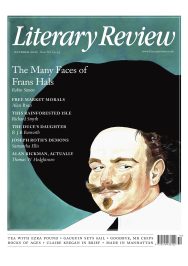Michael Bywater
War on Averages
Am I Normal? The 200-Year Search for Normal People (and Why They Don’t Exist)
By Sarah Chaney
Profile/Wellcome Collection 336pp £16.99
The first thing to strike the reader of Am I Normal? is, as it should be, the cover. It shows an ornate hand mirror, beautifully rendered. But look into its silvered surface and… nothing. There is no reflection, just a nondescript cloudy greyness.
The mirror confronts us with the set of questions we all live with here in the fragmenting Age of the Self. Are we as others are? What is normal? Who decides? Sarah Chaney, who has spent much of her professional life studying the history of emotions at Queen Mary University of London, is at loggerheads with the word ‘normal’, a favourite of moral imperativists wherever they gather. The chapter scheme of her engaging book, with titles ranging from ‘Is My Sex Life Normal?’ to ‘Are My Kids Normal?’, makes no bones about her purpose. She lets her readers into the labyrinth in the first chapter. It’s always endearing to read an author’s confessions. ‘Is my body a normal shape or size?’ she asks herself. ‘Is it normal to cry in front of others? To let my dog lick my face? To have heavy periods? To have sex with strangers? To feel anxious on public transport? To feel bloated after eating?’ To which my answers are: depends, yes, yes, don’t know, can’t remember, no, and yes – before, during and after.
The word ‘normal’ signifies to me various sorts of drab, faded Dad jeans, ironic tattoos and desires beneath your station. But it also forms part of an interesting lexicon. If you are lucky enough to visit the island of Samos, the sculpture of Pythagoras will act as a guide.

Sign Up to our newsletter
Receive free articles, highlights from the archive, news, details of prizes, and much more.@Lit_Review
Follow Literary Review on Twitter
Twitter Feed
It wasn’t until 1825 that Pepys’s diary became available for the first time. How it was eventually decrypted and published is a story of subterfuge and duplicity.
Kate Loveman tells the tale.
Kate Loveman - Publishing Pepys
Kate Loveman: Publishing Pepys
literaryreview.co.uk
Arthur Christopher Benson was a pillar of the Edwardian establishment. He was supremely well connected. As his newly published diaries reveal, he was also riotously indiscreet.
Piers Brendon compares Benson’s journals to others from the 20th century.
Piers Brendon - Land of Dopes & Tories
Piers Brendon: Land of Dopes & Tories - The Benson Diaries: Selections from the Diary of Arthur Christopher Benson by Eamon Duffy & Ronald Hyam (edd)
literaryreview.co.uk
Of the siblings Gwen and Augustus John, it is Augustus who has commanded most attention from collectors and connoisseurs.
Was he really the finer artist, asks Tanya Harrod, or is it time Gwen emerged from her brother’s shadow?
Tanya Harrod - Cut from the Same Canvas
Tanya Harrod: Cut from the Same Canvas - Artists, Siblings, Visionaries: The Lives and Loves of Gwen and Augustus John by Judith Mackrell
literaryreview.co.uk